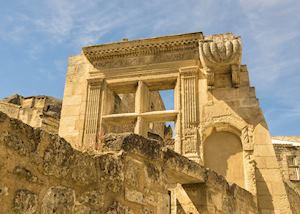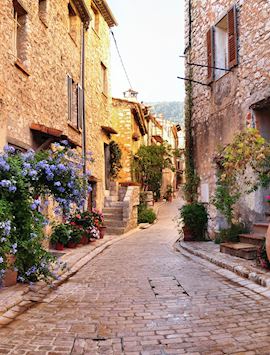Jump to:
Occupying the steep sides of a limestone outcrop in the foothills of the Alpilles mountains, the village of Les-Baux-de-Provence is a jumble of endearingly wonky 16th- and 17th-century houses, chapels and mansions.
They line tiny medieval streets that weave organically around giant spurs of rock on their way to the village's crowning glory, the 11th-century fortified Château des Baux. Les-Baux-de-Provence is undeniably a very popular destination, but our specialists can help you discover it in a more authentic manner, and at quieter parts of the day.
 Inhabited since 6,000 BC, the elevated position and excellent views over the plains gave Les-Baux-de-Provence a defensive advantage. The hilltop was first fortified in the 10th century, with the fortress extended and developed over the following years until the princes of Baux controlled much of Provence.
Inhabited since 6,000 BC, the elevated position and excellent views over the plains gave Les-Baux-de-Provence a defensive advantage. The hilltop was first fortified in the 10th century, with the fortress extended and developed over the following years until the princes of Baux controlled much of Provence.
By the 12th century, the court was also renowned for its highly cultivated lifestyle and, although the last princess of Baux died in the 15th century, the honorary title of Marquis of Baux was retained and passed to the heir to the throne of Monaco.
The Château des Baux commands a position at the top of the village and, although largely destroyed in the 17th century, its ruins are substantial. It's worth the climb to seek out the expansive views from its towers, and to explore the dungeons and see the reconstructions of medieval weapons such as trebuchets (a type of giant catapult), ballistas (an ancient missile launcher) and battering rams. In summer, you can watch the weapons in action as well as themed entertainment and duels by costumed actors.
Apart from the castle, the village's charm lies in its rustic architecture and its setting where the outcrops of rock are woven into the very fabric of the streets. The cobbled, car-free lanes are lined with cafés, a clutch of excellent restaurants and little shops selling local products and produce such as wine and olive oil.
There are several old churches and chapels to seek out, and you can visit the town's former limestone quarries to see a light show that illuminates the cavernous galleries. The Carrières de Lumières teams rousing music with giant projections that light up the walls, floor and ceiling in dramatic fashion. Nearby, you will also find the monastery-asylum at Saint-Paul de Mausole where Vincent van Gogh admitted himself in 1889. He stayed here for a year, painting the surrounding wheat fields and recuperating. You can visit his reconstructed room and walk along trails through the tranquil gardens where he set up his easel.
who's been there

Start planning your tailor-made trip to Les-Baux-de-Provence by contacting one of our France specialists
-
617-223-4521617-223-4762
- Make an inquiry
Suggested itinerary featuring Les-Baux-de-Provence
This sample itinerary will give you an idea of what is possible when you travel in Les-Baux-de-Provence, and showcases routes we know work particularly well. Treat this as inspiration, because your trip will be created uniquely by one of our specialists.
Places near Les-Baux-de-Provence
- ³§²¹¾±²Ô³Ù-¸éé³¾²â-»å±ð-±Ê°ù´Ç±¹±ð²Ô³¦±ð less than 5 miles away
- Arles 10 miles away
- Avignon 15 miles away
- L'Isle-sur-la-Sorgue 18 miles away
- Pont-du-Gard 20 miles away
- ²Ñé²Ô±ð°ù²ú±ð²õ 22 miles away
- Châteauneuf-du-Pape wine region 22 miles away
- Gordes 24 miles away
- ±«³úè²õ 27 miles away
- Orange 28 miles away
- Roussillon 28 miles away
- Aix-en-Provence 36 miles away
- Provence 74 miles away
- Saint-Tropez 99 miles away
- The French Riviera 99 miles away
- ¸é³óô²Ô±ð-´¡±ô±è±ð²õ 104 miles away
- Grasse 107 miles away
- Saint-Paul-de-Vence 117 miles away
- Antibes 118 miles away
- Nice 123 miles away
- Saint-Jean-Cap-Ferrat 127 miles away
- ȳú±ð 129 miles away
- Monaco and Monte Carlo 132 miles away
- Lyon 140 miles away
- Talloires 161 miles away
- Annecy 164 miles away
- Dordogne 170 miles away
- Chamonix 177 miles away
- La Roque-Gageac 194 miles away
- ³§²¹°ù±ô²¹³Ù-±ô²¹-°ä²¹²Ôé»å²¹ 194 miles away
- Castelnaud-la-Chapelle 196 miles away
- Beynac-et-Cazenac 196 miles away
- ³§²¹¾±²Ô³Ù-ɳ¾¾±±ô¾±´Ç²Ô 257 miles away
- Bordeaux 277 miles away
Photos of Les-Baux-de-Provence
Accommodation choices for Les-Baux-de-Provence
We've selected a range of accommodation options for when you visit Les-Baux-de-Provence. Our choices usually come recommended for their character, facilities and service or location. Our specialists always aim to suggest properties that match your preferences.
-
![Baumanière Les Baux-de-Provence, Les Baux-de-Provence]()
Baumanière Les Baux-de-Provence
Les-Baux-de-Provence


